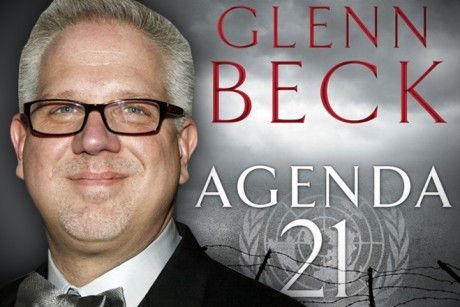
In Agenda 21 radio host and political commentator, Glenn Beck [i], has put to paper an outlandish version of his own paranoid conspiracy theories and dystopian predictions of the future.
I can’t describe the book as a
thriller (as it isn’t thrilling in anyway) or as a nightmare (because to be frightening,
it would have to be believable, and it isn’t.)
Beck (since his name is
emblazoned on the cover, he gets the blame)
has created a bizarre future world wherein a distant and never actually
seen Central Authority has crushed the American democratic government and
collectivized private property. Everyone
lives in centrally planned communities.
Every decision from birth to death is made by the Authorities.
And it’s all because of
Agenda 21 – a nonbinding, voluntarily implemented action plan developed by the United
Nations to promote sustainable development – that is, to meet human needs
without polluting the environment and depleting natural resources. But in Beck’s delusion, this means socialist
totalitarianism. Everything Beck doesn’t
like means socialist totalitarianism.
The novel is dull.
The novel is dull.
There is no action,
only a series of history lectures given to the protagonist, Emmeline – who is a
surrogate for the reader. She is a
home-raised, homeschooled young woman – she did not attend the village school. Emmeline, ostensibly the heroine of the story,
is profoundly ignorant about the events that led up to her world situation and
about how to live in that world. It
makes me wonder if Beck isn’t hurting one of his own favorite causes:
homeschooling. Emmaline is unbelievably ignorant. How could her parents (her mother a history
teacher, even) have raised her for 14 years and kept her so sheltered that she
knows nothing about the past or her present?
She, in effect, becomes the epitome of that stereotypical ignorant and unsocialized
homeschooled kid.
Seriously, the novel is
dull. And it doesn’t help that the writing
is flat and unimaginative. It’s a very
easy to read book; I read it in a couple of hours – but that’s not a plus. It’s
simplistic and shallow. The characters
are one dimensional (if that) and exhibit none of the complexities that make
people so interesting.
But Beck isn’t really interested
in people, nor is he interested in human drama or compelling stories. He’s got
his own agenda: Selling tinfoil hats and making lots of money.
[i]
Yes, I am aware that the book’s
afterward makes it perfectly clear that Harriet Parke actually wrote the book,
but if Beck is going to splash his name across the cover to take credit for it,
then he’s going to take the blame for it too.




No comments:
Post a Comment